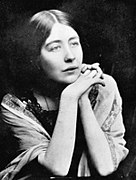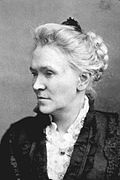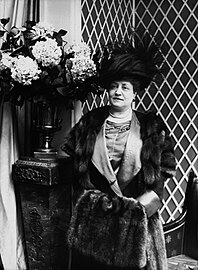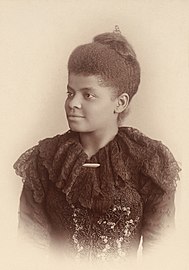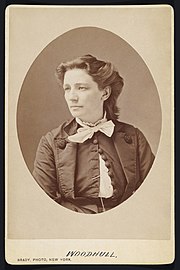Portal:Feminism


Feminism is a range of socio-political movements and ideologies that aim to define and establish the political, economic, personal, and social equality of the sexes. Feminism holds the position that modern societies are patriarchal—they prioritize the male point of view—and that women are treated unjustly in these societies. Efforts to change this include fighting against gender stereotypes and improving educational, professional, and interpersonal opportunities and outcomes for women.
Originating in late 18th-century Europe, feminist movements have campaigned and continue to campaign for women's rights, including the right to vote, run for public office, work, earn equal pay, own property, receive education, enter into contracts, have equal rights within marriage, and maternity leave. Feminists have also worked to ensure access to contraception, legal abortions, and social integration; and to protect women and girls from sexual assault, sexual harassment, and domestic violence. Changes in female dress standards and acceptable physical activities for women have also been part of feminist movements.
Many scholars consider feminist campaigns to be a main force behind major historical societal changes for women's rights, particularly in the West, where they are near-universally credited with achieving women's suffrage, gender-neutral language, reproductive rights for women (including access to contraceptives and abortion), and the right to enter into contracts and own property. Although feminist advocacy is, and has been, mainly focused on women's rights, some argue for the inclusion of men's liberation within its aims, because they believe that men are also harmed by traditional gender roles. Feminist theory, which emerged from feminist movements, aims to understand the nature of gender inequality by examining women's social roles and lived experiences. Feminist theorists have developed theories in a variety of disciplines in order to respond to issues concerning gender.
Numerous feminist movements and ideologies have developed over the years, representing different viewpoints and political aims. Traditionally, since the 19th century, first-wave liberal feminism, which sought political and legal equality through reforms within a liberal democratic framework, was contrasted with labour-based proletarian women's movements that over time developed into socialist and Marxist feminism based on class struggle theory. Since the 1960s, both of these traditions are also contrasted with the radical feminism that arose from the radical wing of second-wave feminism and that calls for a radical reordering of society to eliminate patriarchy. Liberal, socialist, and radical feminism are sometimes referred to as the "Big Three" schools of feminist thought.
Since the late 20th century, many newer forms of feminism have emerged. Some forms, such as white feminism and gender-critical feminism, have been criticized as taking into account only white, middle class, college-educated, heterosexual, or cisgender perspectives. These criticisms have led to the creation of ethnically specific or multicultural forms of feminism, such as black feminism and intersectional feminism. Some have argued that feminism often promotes misandry and the elevation of women's interests above men's, and criticize radical feminist positions as harmful to both men and women. (Full article...)

The "Maid of Orleans", Joan of Arc is a national heroine of France and a saint of the Roman Catholic Church. She helped inspire Charles VII's troops to retake most of his dynasty's former territories, which had been under English and Burgundian dominance during the Hundred Years' War. She later was convicted of heresy (overturned posthumously) and burnt at the stake at the age of nineteen. Pope Benedict XV canonized her on 16 May 1920 and she is now one of the most popular saints of the Catholic Church.
Shown here is a statue of Joan of Arc inside Notre-Dame de Paris, a Gothic cathedral in Paris, where she was beatified in 1909.
- July 1843 – First publication in The Dial of Margaret Fuller's essay The Great Lawsuit, one of the first American feminist works
- July 1923 – Foundation of the People's Party of Women in the Republic of Turkey by Nezihe Muhiddin
- 14 July 1858 – Birth of Emmeline Pankhurst, the driving force behind women's suffrage in the United Kingdom
- 15 July 1907 – Execution of Qiū Jǐn (秋瑾) (pictured), a Chinese anti-Qing Empire revolutionary, feminist and writer.
- 19 July 1848 – Seneca Falls Convention, the first women's rights convention in the United States, organized by Elizabeth Cady Stanton and others, where she presented her Declaration of Sentiments and advocated women's right to vote

- ... that after dying in her daughter's arms in an asylum in 1897, Maria Trubnikova was remembered as the "heart and soul" of feminist activism in Russia?
- ... that Margareth Rago seeks to establish a methodology for what she calls "feminist science"?
- ...that while Mary Wollstonecraft (pictured) wrote her revolutionary treatise the Rights of Woman in six weeks, its novelistic sequel, The Wrongs of Woman, was still unfinished at her death, despite a year's work?
- ...that the modern-day role of women in the Philippines is similar to their social status during pre-colonial times?
- ...that Eleanor Davies-Colley was the first woman admitted as fellow of the Royal College of Surgeons of England?
| This is a list of recognized content, updated weekly by JL-Bot (talk · contribs) (typically on Saturdays). There is no need to edit the list yourself. If an article is missing from the list, make sure it is tagged (e.g. {{WikiProject Feminism}}) or categorized correctly and wait for the next update. See WP:RECOG for configuration options. |
Featured articles
Vidya Balan
Louise Bryant
Josephine Butler
Control (Janet Jackson album)
Marjory Stoneman Douglas
Female genital mutilation
Margaret Fuller
Emma Goldman
Inter-Allied Women's Conference
Janet Jackson
Kahaani
Olive Morris
Mothers of the Disappeared
Jessie Murray
Margaret Murray
Florence Nagle
Emmeline Pankhurst
Katy Perry
Adelaide Anne Procter
Susan B. Anthony dollar
Taylor Swift
Maria Trubnikova
Harriet Tubman
A Vindication of the Rights of Woman
Emma Watson
We Can Do It!
Wife selling (English custom)
Mary Wollstonecraft
École Polytechnique massacre
Featured lists
Good articles
Nineteenth Amendment to the United States Constitution
Ángela Acuña Braun
Chimamanda Ngozi Adichie
Susan B. Anthony II
Elena Arizmendi Mejía
Trinidad Arroyo
Aurora (Sleeping Beauty)
Ay mamá
Rachel Barrett
Gerlin Bean
Belle (Disney character)
Beyoncé
Birth control
Jeni Bojilova-Pateva
Virginia Bolten
Build a Bitch
Can't Hold Us Down
Claudia Cardinale
A Catholic Statement on Pluralism and Abortion
Cherry Wine (Hozier song)
Child prostitution
Lara Croft
Cutting the Mustard
Lucinda Lee Dalton
Emily Davies
Maymie de Mena
2012 Delhi gang rape and murder
The Dirty Picture
Elisabeth Dmitrieff
Double burden
Anne Dallas Dudley
Andrea Dworkin
Mary Beth Edelson
Lilian Faithfull
Feminism
Feminism in Russia
Feminist Improvising Group
Feminist economics
María Teresa Ferrari
Anna Filosofova
Princess Fiona
Jane Fonda
Marge Frantz
Edith Garrud
Kirsten Gillibrand
Glorieta de las mujeres que luchan
Laura de Force Gordon
Government Hooker
Güzel İstanbul
Aileen Hernandez
Hitachi Magic Wand
Hole (band)
Howl's Moving Castle (film)
Clair Huxtable
I'll Make a Man Out of You
Incel
Independent Women's Forum
Jane Collective
Jasmine (Aladdin)
Doris Sands Johnson
India Juliana
Kim Possible
Gina Krog
Lady Like
Lady Like (song)
Astrid Lindgren
Love, Loss, and What I Wore
Madonna
Malouma
Marie of Romania
Bertha Mason (suffragist)
Lise Meitner
Maria Mies
Kate Millett
Moana (character)
Mother's Little Helper
Mulan (Disney character)
Nala (The Lion King)
Louise Nevelson
No One Killed Jessica
Paper or Plastic (song)
Patricia Paputsakis
Roy Earl Parrish
Part of Your World
Planned Parenthood
Kim Possible (character)
Pussy Riot
Funmilayo Ransome-Kuti
A Rape on Campus
Megan Rapinoe
Rasan (organization)
Marcela Revollo
Tessie Reynolds
Nina Salaman
Zainab Salbi
Linda Sarsour
Cher Scarlett
Rosika Schwimmer
Seneca Falls Convention
Shadowland (song)
Chava Shapiro
Manal al-Sharif
Mary Stuart Smith
Valerie Solanas
Miriam Soljak
Hope Solo
Elizabeth Cady Stanton
Shelby Starner
Gloria Steinem
Jessie Stephen
Doris Stevens
Cecilia Suárez
Tailhook scandal
Thung Sin Nio
Nino Tkeshelashvili
A Toast to Men
Lana Turner
Mary Two-Axe Earley
Ugly (Fantasia song)
WAP (song)
Jean Walton
Abby Wambach
The Woman's Bible
Woman's club movement in the United States
Optional Protocol to the Convention on the Elimination of All Forms of Discrimination Against Women
Women in early modern Scotland
Women in classical Athens
Women's International Democratic Federation
Women's March on Portland
Women's suffrage in Wales
Xue Susu
Featured pictures
-
Alice Manfield - Guide Alice, Mt Buffalo, c1900-30, SLV
-
Alice Park - Records of the National Woman's Party
-
Alice Paul (1915) by Harris & Ewing
-
Angela Davis in a half-length portrait by Bernard Gotfryd - crop
-
Anne Dallas Dudley LOC
-
Avril de Sainte-Croix - Restored, cropped
-
Bertha Lutz 1925
-
Cabinet Card of Sojourner Truth - Collection of the National Museum of African American History and Culture
-
Convicts Lunatics and Women! Have No Vote for Parliament, ca. 1907-1918
-
Dr. Caroline Spencer 275029v
-
Ethel Smyth
-
Frances Benjamin Johnston, Self-Portrait (as "New Woman"), 1896
-
Fredrikke Mørck
-
George Charles Beresford - Virginia Woolf in 1902 - Restoration
-
Henrietta Rodman from the George Grantham Bain Collection
-
Henry Mayer, The Awakening, 1915 Cornell CUL PJM 1176 01 - Restoration
-
Hester Jeffrey
-
Hubertine Auclert 1910
-
Iris Calderhead
-
Joy Young Rogers outside the White House
-
Lucretia Mott, signed photo, by F. Gutekunst
-
Mabel Vernon, c. 1917, by Edmonston, Washington, D.C.
-
Marguerite Durand 1910 - Restoration
-
Marie Stopes in her laboratory, 1904 - Restoration
-
Mary Garrity - Ida B. Wells-Barnett - Google Art Project - restoration crop
-
Millicent Fawcett
-
Mrs. Crystal Eastman Benedict by Edmonston, Washington, D.C.
-
Mrs. Lillian Ascough, chairman of the Connecticut branch of the Woman's Party
-
Mrs. Pauline Adams 147002v
-
Portrett av Gina Krog (6276081582) - Restoration
-
Poster by Anna Soós Korànyi for the Seventh Conference of the International Woman Suffrage Alliance
-
Ray Strachey restored
-
Sojourner Truth, 1870 (cropped, restored)
-
Victoria Claflin Woodhull by Mathew Brady - Oval Portrait
-
Voltairine de Cleyre (Age 35)
-
We Can Do It! NARA 535413 - Restoration 2
Featured portals
Good topics
- Add {{Portal|Feminism}} to the See also section of Feminism-related articles.
- Tag the talk pages of Feminism-related articles with {{WikiProject Feminism}}
- Join Wikipedia:WikiProject Feminism
- Cleanup: A cleanup listing for this project is available, updated by CleanupWorklistBot.
- Notability: Articles with notability concerns, listed at WikiProject Notability
- Rate the Unassessed Gender Studies articles in the Gender Studies WikiProject.
- Requested articles: Requested articles on Feminism, Requested articles on Feminist figures
- Stubs: Gender studies stubs, Feminism stubs, Women's rights activist stubs
The following Wikimedia Foundation sister projects provide more on this subject:
-
Commons
Free media repository -
Wikibooks
Free textbooks and manuals -
Wikidata
Free knowledge base -
Wikinews
Free-content news -
Wikiquote
Collection of quotations -
Wikisource
Free-content library -
Wikiversity
Free learning tools -
Wiktionary
Dictionary and thesaurus








































